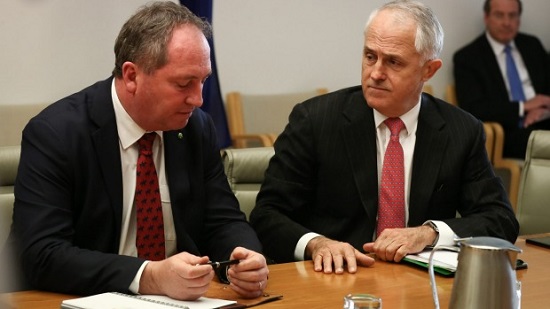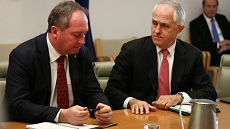The week began with Newspoll maintaining Labor’s TPP lead at 52-48, and ended with Kelly O’Dwyer endorsing a bill that criticised the Government. In between Turnbull got the Senate to pass his legislation supporting Victoria’s CFA volunteers, with Pauline Hanson’s support, and one of the National senators stood aside so that Pauline could join the NBN committee.
The major political event of the week, however, was Labor killing off the marriage equality plebiscite legislation. Sure, it still has to go to the senate, but Xenophon, the Greens and Labor oppose it, so it can’t pass.
Laura Tingle says the Faustian bargain Turnbull struck with the Nationals to become PM is eroding the rationale for replacing Abbott with Turnbull.
Put simply, Turnbull was attractive because people thought he would bring politics back to the centre. However, to get the gig he had to do a deal with the Right, some of whom are now exploiting his wafer thin majority by threatening to resign from the Coalition and sit on the cross-bench if they don’t get their way.
- The perception that Queensland LNP MP George Christensen had, single-handed, forced backdowns on superannuation and on the backpacker tax, has started to embolden more of his colleagues to take up the strategy of setting themselves up to look like kingmakers.
This week, Victorian Nationals MP Andrew Broad emerged to threaten his support of the government if there was a free vote on same-sex marriage. Within hours, Christensen popped up to make the same threat.
Tingle says it’s time these people had a little think about what they are doing. They may end up separating the LNP from the treasury benches. The really crucial dynamic, however, she says is around the Nationals Leader Barnaby Joyce:
- Joyce was once the Senate backbencher from hell for John Howard, effectively holding the balance of power in a Senate where the Coalition actually had a majority.
At times, he remains a nightmare for Turnbull: notably, his early intervention after the South Australian storms blaming renewable energy for the statewide blackout set the scene for everything that was subsequently said on the subject.
It is also true that the LNP – the merged Queensland Liberal and Nationals – believe both that Joyce has to keep a firm hand on Turnbull, and provides an important ‘retail’ political foil to the prime minister.

Quiggin says that in the LNP/ONP coalition, One Nation is now in charge by virtue of their fellow-travellers within the LNP.
One way or another, Turnbull has little scope to be his own man.
On the plebiscite, there is a theoretical possibility that a Labor-initiated marriage equality could pass both houses, with a few Liberals exercising a conscience vote in the Reps, but the Government will simply not allow such a bill to be debated:
- Labor is expected to keep pressing for a free vote in Parliament on whether to legalise same-sex marriage.
But a number of senior Government ministers have made it clear that will not happen.
Nationals MP Andrew Broad this morning threatened to withdraw his support for the Government if it allowed gay couples to marry without holding the plebiscite.
Bill Shorten has been accused of playing politics on the issue. However, the Four Corners program For Better or Worse showed how many politicians had changed their position in recent years. I think it would be true to say that the only politician advocating a position at variance with his own beliefs is Malcolm Turnbull. That is, if he actually believes in anything these days.
The Four Corners program also showed, beyond doubt, the kind of toxic advertising that opponents of equal marriage would unleash. Some of it already exists.
There are many reasons against having a plebiscite, but the most important is the potential (virtually certain) harm to LGBTI people, especially the young:
- A joint study by Victoria University and the University of Queensland that looked at the same-sex marriage referendum in Ireland, released on Sunday, found gay people suffered serious emotional trauma as the public debated unfolded in 2015.
The university surveyed 1600 LGBTI people in Ireland via interviews conducted over social media and found less than a quarter would be happy to repeat the referendum process.
Nearly three-quarters said the ”no” campaign had a highly detrimental impact on young LGBTI people and the children of LGBTI parents.
Now the Sydney Anglican archbishop has:
-
refused to renew the licence of a Sydney priest, Keith Mascord, due to theological differences, particularly his support for same-sex marriage.
This has deeply shaken the church, leading to a petition from clerics Australia-wide:
- “For most clergy, delicencing means losing job, income, accommodation, peer networks and spiritual community,” the petition read.
Not to mention the hypocrisy of simultaneously calling for “a publicly-funded plebiscite to promote respectful and genuine debate”.
Elsewhere, reports reveal that the Anglican Church has distributed a booklet, warning against communism, child brides, marriage of close relatives and polygamy.
Enough said.
For Labor now, the issue may be revisited at the National conference next year. Marriage equality is due to become Labor policy in 2019, so there will be no free vote. Some are worrying that it is unfair for Labor to ask for a free vote from the LNP when theirs is tied.
Penny Wong and Tanya Plibersek are arguing that marriage equality is a human right, rather than a matter of conscience. It’s a powerful argumaent within labor, and hard to see them back-tracking.


Gillard and Rudd had both Houses.
Gillard led a minority government.
With the greens and the balance in the Senate, no excuses.
What’s your point, Jumpy?
Not a point but a question, why didn’t ALP/greens get it done when there was no barrier ?
Record amounts of Legislation passed, where did this sit as a priority then ?
How about we take this particular Punch and Judy stick off the Pollies and tell them it’s none of their business.
It amazes me that the choices we except are between 2 forms of government control and not what gives them the right to control it at all.
Gillard opposed marriage equality. This would indicate it wasn’t a priority for her, unlike Turnbull who supported marriage equality at the time; for some reason he seems to have changed his mind.
It was J W Howard who changed the Marriage Act to discriminate against same sex couples. We wouldn’t be having any of this particular “Punch and Judy stick” (whatever that is) without him.
Is the Federal coalition power-hungry, or strangely power-averse?
I don’t recall ALP members of Reps making such open threats to cross the floor, when Ms Gillard had a minority govt.
Were all conflicts kept out of sight, in house?
Turnbull voted against it in 2012, along with much of ALP.
http://www.abc.net.au/news/2012-09-19/same-sex-marriage-bill-voted-down/4270016#votestable
After that the yes crowd were promoting a plebiscite.
Lot’s of opportunist garbage from Canberra while most Australians don’t care much, one way or the other.
Jumpy, Gillard has explained in her book that she was never against gay marriage as such, rather against the institution itself. Back in the radicalism of the 1960s and learlly 1970s many people saw marriage as an unnescessary legal bond, which only made problems if people wanted to change partners. Gillard says she was in this tradition.
You’ll notice that she did not marry her partner.
However, she says people have even more chosen it as an option. Times and social norms have changed, and marriage is clearly an honoured institution once again for the vast majority. Gillard says she would now support marriage equality if she was still in politics.
Priorities have changed, and LGBTI people want what is available to them in most other countries where they might choose to live.
I think you are misreading that. The proponents for and against are deadly serious on a matter of principle, except for Malcolm, who is politically serious.
I’d like to make two points.
First, there was some speculation that Labor would revisit the marriage equality issue at their national conference next year. The thought was that they might return to giving members a free vote, rather than having marriage equality as party policy.
This turned out to have stemmed from an Albo interview on radio. He made clear on Friday night talking to Patricia Karvelas that he had no desire to revisit Labor’s stance, and no-one else did either.
Secondly, there has been criticism of Labor delaying its response and thus playing politics. This criticism has come from the Greens, the media, commentators and of course the LNP.
Happens there is a democratic process to be undertaken. Bill Shorten made clear at all times what his recommendation to Caucus would be, but consistently said that the issue must be considered by the full Caucus. That’s what happened, at the first opportunity.
Yet we had two particularly silly commentators telling Karvelas that Labor’s position was 90% politics.
Mark Dreyfus (Courier Mail 15 Oct pp62) pointed out that: “There are a legion of hard issues that this parliament has looked in more than a century of federation and on all of the occasions when the rights of Australians have been altered, the rights of Australians in Australian law, they have been altered by a vote in this parliament.” Examples he gave to put this statement in context included banning racial discrimination and changing laws to permit Aboriginal Australians to marry non-Aboriginal Australians.
A good democracy is one where the rights of minorities are protected against unfair treatment by the majority. A good parliament should lead in this protection of minorities instead of waiting for the majority to change to a fairer way of thinking
We are being told that the government is being blocked from putting the gay marriage issue to parliament by the so called National Party. As a matter of interest, the 11 Oct had the National Party at a massive 3% of the vote.